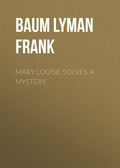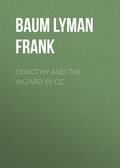
Лаймен Фрэнк Баум
The Last Egyptian
CHAPTER XXIV
THE SHEIK DEMURS
No one on board the dahabeah had entertained even a suspicion of danger. Winston Bey knew well the unreliable character of the natives of certain villages, but even he did not dream that the steamer would be molested or its passengers annoyed; therefore, the surprise was complete.
Mrs. Everingham, awakening with a start, heard the patter of many feet upon the deck and saw a man advancing into the cabin where she and Aneth had been sleeping.
Her first inspiration was to scream; but instead she reached beneath her pillow and drew out a small revolver, with which she fired two shots in rapid succession point blank at the intruder.
Neither bullet took effect, but they startled Kāra as much as her vigorous screams, in which Aneth now joined. He retreated hastily from the cabin, thus allowing Mrs. Everingham to close the door and secure it with a heavy bar provided for that purpose.
The after-cabin having been given up to the women, Winston and Lord Roane occupied a smaller cabin forward. Between the two were the kitchen and the engine-room. As the natives boarded the steamer near the bow, their first act was to drop into the forward cabin and seize the white men before they were fairly awake. Roane offered no resistance whatever, but Winston struggled so energetically that it took three of the men, headed by the gigantic sheik, to secure him. It required but a few moments to bind the prisoners securely hand and foot, and then they were left in their bunks under a guard of natives, who held their bare knives in their hands in readiness to prevent any possible escape.
The four Arabs of Winston’s crew were easily overcome, and by the time that Kāra arrived forward they laid upon the deck carefully pinioned. There had been no bloodshed at all, and the steamer was now entirely in the control of Kāra and his mercenaries.
“All right,” said the sheik, nodding his satisfaction as the Egyptian approached. “It was very easy, my prince. The two white men are below, and the boat is ours.”
Kāra, by the dim light of a lantern, peered into the faces of his prisoners.
“Where is the dragoman?” he asked. “Did you kill him, as I commanded you to do?”
“We had not that pleasure,” returned the sheik, “for he was not on board.”
“Are you sure?”
“Very sure, my prince.”
“He may be in hiding. Search every part of the steamer thoroughly except the cabin of the women.”
The sheik shrugged his shoulders, but gave the command to his men. They examined every possible hiding-place without finding the dragoman.
Meanwhile Kāra squatted upon the deck, thinking earnestly of what his future action should be, while the silent sheik sat beside him with composed indifference. When the Arabs returned from their unsuccessful quest, the Egyptian said to his ally:
“Let your men watch the prisoners until morning. We can do nothing more at present.”
So they stretched themselves upon the deck and rested until daybreak.
As soon as it was light enough to distinguish objects readily, Kāra arose and ordered Winston and Lord Roane brought upon deck. There they saw the Egyptian for the first time and understood why they had been attacked.
“I suspected that I owed this little diversion to you,” said Winston, glaring angrily upon his enemy. “Perhaps you do not realize, Prince Kāra, that by this lawless act you have ruined yourself and your career.”
“No,” returned Kāra, smiling; “I do not realize that.”
“These things are not tolerated in Egypt to-day,” continued the Bey.
“Not if they are known,” admitted Kāra.
“Do you think, sir, that I will remain silent?” demanded Winston, indignantly.
“Yes.”
“And why?”
“Because I have no intention of permitting you to return to Cairo. Understand me, Winston Bey – I entertain no personal enmity toward you; but you saw fit to interfere with my purposes, and in doing so destroyed yourself. Having been lawless enough to capture your boat, an outrage only justified by my desire to obtain possession of the persons of Aneth Consinor and Lord Roane, I am compelled, in order to protect myself, to silence every person aboard who might cause me future annoyance. Therefore, it is necessary to kill you.”
“You dare not!”
“You misjudge me,” answered Kāra, coolly; “but I shall be glad to furnish you immediate proof of my sincerity.” Turning to Antar, he said: “Comrade, oblige me by placing your knife in the heart of Winston Bey.”
The sheik did not move.
“Well?” cried Kāra, impatiently.
“It is not in the compact,” returned the imperturbable Arab.
“You are wrong,” said the Egyptian, sharply. “It was fully understood you should obey my commands, especially as to killing those of my enemies whom I desired to silence.”
“My brother will remember,” returned the sheik, “that there was also another understanding – a little matter relating to certain jewels and piastres.”
“You shall have them!”
“And you shall be obeyed – when I have them.”
Winston smiled, and Kāra saw it and uttered a curse.
“Will you thwart me now, when it is too late for either of us to retreat with safety?” he asked Antar, angrily.
“By no means. I do not object to the killing, believe me, my brother; but my people are poor, and the money you have promised them will do much to ease their sufferings. Let me but see the gems and the piastres and all your desires shall be gratified.”
Winston looked at the gigantic Arab closely. He seemed to remember the man, but could not place him, for Antar had not only trimmed his gray beard, but had dyed it a deep black. Still, all natives are crafty and covetous, and the words he had overheard gave him an idea.
“Listen, my sheik,” he said in Arabic. “If it is money you wish, I will double Kāra’s offer to you. It is but natural that a man will pay more for life than another will pay for revenge. State your price, and the sum shall be yours.”
Antar turned toward the Egyptian, an expression of satisfaction upon his keen features.
“My brother will answer,” he said.
“This is absurd,” declared Kāra. “Winston Bey but trifles with you. His money is all in Cairo. When you go there to get it, he will throw you into prison, and your people will be destroyed and their houses torn down to satisfy the Government police.”
“The noble sheik is no fool,” observed Winston. “He will keep us in his power, closely guarded, until he has sent to Cairo and obtained the money. Also, I will promise not to betray him, and my word is as good as that of Prince Kāra.”
“But why should he go to Cairo at all?” asked the Egyptian. “If he will but come with me to Fedah he shall have his price. Not all of Winston Bey’s wealth can approach the magnificence of the treasure I will place in Antar’s hands.”
The eyes of the sheik sparkled.
“Good!” he exclaimed.
“You will be faithful to me?” asked Kāra.
“Why not?”
“There is much treasure at my command. Not a mere handful of gems shall be yours, but enough to make your tribe wealthy for all time to come.”
“I believe that my brother speaks truth.”
“Then,” said Kāra, relieved, “I ask you to kill Winston Bey as a proof of your confidence in me. The others may live until we get to Fedah.”
“Tah! What is the use of dividing the ceremony?” returned the sheik, with a gesture of indifference. “I like not this pig-sticking in sections. It means cleaning one’s knife several times instead of once. Be patient, my brother. When we have arrived at Fedah and our friendship is further cemented by your royal generosity, then will I accomplish all the killing in a brief space and have done with it. Is it not so?”
Kāra hesitated, but saw clearly that the wily sheik would not trust him. Moreover, he feared that Winston’s eager offers to outbid him, if persistently repeated, might prove effectual unless he carried out his own promises to the greedy Arab. He had not expected to pay Antar any great price for his services, and in the beginning intended that the “handful” of gems would be a very small one; but Antar had entrapped him cleverly, and he now realized he must expend an exorbitant sum to induce the old sheik to obey his orders.
After all, that did not matter. The entire treasure had been Hatatcha’s before it descended to him, and a portion of it would be well expended in securing her vengeance. He alone knew that the hoard was practically inexhaustible, and he might even bury the big Arab in jewels and golden ornaments and still have left more than he could use in his own lifetime.
So he agreed, with assumed content, to Antar’s proposition, and Abdallah, the engineer, was released from his bonds and instructed to start the dahabeah upon its voyage up the river. It would be thirty hours before they could hope to reach Fedah.
Roane and Winston were permitted to remain upon deck, but were tied to their chairs and carefully guarded. Breakfast was served, and Kāra accompanied the Arab who carried the tray to the cabin of the women. The Egyptian had not disturbed them since the night before, well knowing they had made themselves as secure as he could have done.
He rapped boldly upon the door and said:
“Let me in.”
“Who is it?” asked Mrs. Everingham.
“Prince Kāra.”
“By what right do you annoy us with your presence aboard this boat?” she continued.
“That I will explain when you permit me to see you,” he answered.
For a few moments there was silence.
“Your breakfast is here, and the servant is waiting for you to open the door,” continued Kāra.
Somewhat to his surprise the bar was removed, and Aneth threw the door wide open.
“One moment, please!” cried Mrs. Everingham, and as Kāra was about to enter he saw the lady standing in the middle of the cabin with her revolver pointed toward him.
“I was so startled last night that I missed you,” she said, calmly; “but I am almost certain I can shoot straight this morning.”
Kāra shrank back a little.
“Why do you fear me?” he asked.
“I don’t,” she answered. “It is you who fear, and with reason. But I do not trust you, because you have convinced me that you are a consummate scoundrel. If you have anything to say to me or to Miss Consinor, we are prepared to hear it; otherwise you had better go, for I am extremely nervous and my finger is upon the trigger.”
“I have taken possession of this steamer,” he announced. “All on board are now my prisoners.”
“How dramatic!” she returned, with a laugh. “May I ask what you intend to do with us? Will you scuttle the ship, or raise the black flag and become a modern pirate of the Nile? Come, my buccaneer, confide to us your secret?”
“In due time, madam, you shall know all, and more, perhaps, than will please you,” he answered, furious at her gibes. “One thing, however, is certain. Miss Consinor” – and here he cast an evil glare at the girl, who stood with white face in the background – “shall not escape me again. I intend to take her to Cairo and keep her secure in my villa. As for you, Mrs. Everingham, your life hangs by a thread. If I could depend upon your discretion and silence I might spare you; but you are clever enough to understand that I cannot afford to take chances of future accusations.”
“My man,” replied Mrs. Everingham, “your own miserable life is at this moment not worth a farthing’s purchase. If you dare to molest this girl or me again, or even show your ugly face in this cabin, I swear to shoot you upon the spot. Here, Selim, bring in that tray. Place it on the table; that will do. Now, Prince Kāra, I will give you one minute to disappear.”
That was too long; he was gone in an instant, his face contorted with rage as he cursed the woman who had so successfully defied him.
On deck he met the sheik.
“Tell the engineer to urge the boat forward,” he said; “we must keep moving day and night until we reach Gebel Abu Fedah.”
“Very good,” responded the sheik. “I am even more impatient than you are, my brother. It is only the prisoners, who have been watching us sharpen our knives, that are in no hurry.”
CHAPTER XXV
THE BRONZE BOLTS
Old Sĕra kept watch faithfully that day and the next at her post of observation on the hill, finding solace through the tedium of the hours in an occasional cigarette from her precious box.
Soon after noon of the second day she hurried to Tadros.
“He is coming,” she said.
The dragoman sprang up.
“From which direction?” he inquired.
“From down the river. He is in the steamboat, and in half an hour will be at the landing.”
“Go back at once,” commanded Tadros. “Wait until he lands, and then come to me immediately. I will be in Hatatcha’s house.”
Sĕra obeyed, and, to the dragoman’s surprise, Nephthys followed her mother to the hill. The girl had roused herself when the old woman returned, and seemed to comprehend, from the eager conversation and the dragoman’s orders, that Kāra was coming. She said nothing, however, but hastened after her mother and took a position beside her on the height commanding the river.
Tadros ran to the house of Hatatcha, where Consinor, having rebelled at the confinement in old Nefert’s hovel, had that morning installed himself. It was as safe a refuge as the other, for none of the villagers ventured to enter the grim archway, and so long as the viscount escaped observation Tadros was content. There was little cheer in the gloomy room, however, and Consinor had begun to believe that he could scarcely be recompensed for the miserable hours of waiting by the promised reward when, to his infinite relief, his fellow-conspirator entered to announce that the long-anticipated time for action had arrived.
“There is not a moment to be lost,” said Tadros. “Get under the rushes, quick!”
The viscount immediately burrowed beneath the dry rushes, and the dragoman placed him in such a position that his head was elevated slightly and rested against the stones of the wall, thus enabling him to observe every corner of the room through the loosely strewn covering.
Having safely concealed him, Tadros stood back and examined the rushes critically to satisfy himself that Kāra would have no suspicion that they had been recently disturbed. The arrangement was admirable. He could not see Consinor himself, even though he knew he was hidden there.
“Are you comfortable?” he asked.
“Not very.”
“I mean, can you remain quietly in that position for an hour or more?”
“Yes,” answered Consinor, through the rushes.
“Then I will go,” announced Tadros. “Be very careful in your actions. Remember that a fortune for both of us hinges upon the events of the next hour, and we must make no mistake. I go to watch the street and the desert beyond. Farewell, and may fortune attend you!”
He left the house, dropping the ragged mat over the inner arch and then crossing to Nefert’s hut.
Presently Sĕra came running toward him.
“He has landed and is coming this way,” she reported.
“Very well. Go home.”
“The cigarettes are all gone.”
He tossed her another box, and soon she had disappeared within her own doorway. Nephthys was not with her, but Tadros had forgotten the girl just then.
He crept within Nefert’s front room and hid himself in the shadows in such a way that he could see through the hole, which served as a window, the opposite archway of Hatatcha’s dwelling.
Kāra entered the narrow street and looked cautiously around him. It pleased him that no curious native was in sight. The sheik and his band were in possession of the dahabeah and the prisoners, and were awaiting Kāra’s return with impatience. Therefore, he must enter the secret tomb at once, without the cover of darkness to shield his movements; but the inhabitants of Fedah were dull and apathetic – they were not likely to spy upon him.
He glanced with pride at the ring he wore upon his finger. The talisman of Ahtka-Rā was indeed powerful, for it had enabled him to accomplish all that he desired, and was protecting him even now. Should he take this occasion to restore it to the tomb of his ancestor – that ancient one who had entreated that it be left with his mummy for all time, and had threatened with dire misfortune anyone who dared to remove it? Why should Kāra leave the precious Stone of Fortune in that mountainous dungeon? Why should he deprive himself of the powers it bestowed upon its possessor? It could not now benefit Ahtka-Rā, who was long since forgotten in the nether world; but it might be of service to Kāra in many ways. Yes; he would keep it, despite the pleading and curses of that dead one who so foolishly and selfishly wished it left with his mummy.
Perhaps some day, years hence, he would restore the stone to the sarcophagus from whence he had taken it; but not now. Again he looked at the strange jewel, which seemed of extraordinary brilliancy at that moment, shooting its tongues of flame in every direction. The curse? Henf! Why should he care for the curse of a mummy, when the greatest talisman of fortune in the world was his?
He slipped within the archway of his dwelling and drew the mat closely behind him. Tadros had marked his every movement, and now breathed a sigh of relief. For the present, at all events, the adventure was in Consinor’s keeping rather than his own, and Consinor must suffer the risk of detection.
The dragoman settled himself upon an earthen bench and kept his eyes on the archway. Presently Nephthys came stealing into view, treading with the caution of a cat and crouching low beneath the stone arch. She did not attempt to draw aside the mat, but squatted upon the ground just outside the barrier. Tadros observed her curiously, and noticed that one of her hands was thrust within her bosom, as if clutching some weapon.
A dagger? Perhaps. Nephthys had been wronged, and might be excused for hating Kāra. Should the dragoman interfere to save him? To what end? Before the girl could strike, the royal one’s secret would be in Consinor’s possession, and then – why, Nephthys would save them any annoyance their discovery might entail. Clearly, it was not a case that merited interference.
Meantime Consinor had noted the entrance of Kāra, as well as the care with which the matting had been fastened to keep out prying eyes. It shut out most of the light, also; but that bothered the Egyptian more than it did the Englishman, whose eyes had now grown accustomed to the dimness.
Kāra had to feel his way along the wall to the secret crypt, but he knew the location of the place exactly, and soon found it. Consinor saw him take from the recess a slender bronze dagger with a queerly shaped blade, and an antique oil lamp. With these he approached the opposite wall of the room – that which was built against the mountain – and pushed vigorously against one of the stones.
It swung inward. The spy saw only blackness beyond; but his first consideration was to count the stones from the corner to the opening, and then to note that it was in the third tier or layer of masonry. By this time Kāra had crept through and closed the orifice.
Consinor was breathing heavily with excitement. The great discovery had been made with ease. All he need do was to wait until Kāra came out and left the village, and then he would be able to visit the secret tomb and its treasure-chamber himself.
But as the moments slowly passed – moments whose length was exaggerated into seeming hours – Consinor began to feel uneasy. He remembered that Tadros had impressed upon him the necessity of following Kāra wherever he went. The secret might not be all upon the surface.
Fearful that he had wasted precious time in delay, he threw aside the covering of rushes and approached the wall. It was scarcely necessary to count the stones. He had stared at them so long that he knew the exact spot which Kāra had touched.
Responsive to his push, the great stone again swung backward and he crept through as the other had done and found himself confronted with blackness.
The dragoman had foreseen such an event, and had thoughtfully provided his accomplice with a candle. Consinor lit it, and, leaving the stone entrance somewhat ajar, so that he might have no trouble in escaping if he were compelled to return in haste, he began a cautious exploration of the various passages that led into the mountain.
He lost some time in pursuing false trails; but at length he came upon a burnt match, tossed carelessly aside when Kāra had lighted his lamp, and it lay within the entrance of a rough and forbidding-looking gallery between the rocks.
However, Consinor followed this trail, and after stumbling along blindly until it had nearly ended in a cul-de-sac, he came to a circular door in the cliff which stood wide open. Beyond was a passage carefully built by man into the very heart of the mountain.
The viscount paused to examine the door carefully. It had been most cleverly constructed, and fitted its opening accurately. Six huge bronze bolts, working upon springs, were ranged along its edge, and the single hinge was of enormous size and likewise composed of solid bronze. But he could see no keyhole nor lever by means of which the door had been opened. The outer surface was an irregular rock, harmonizing with the side of the passage, but the edges and the inner surface were carefully dressed with chisels. An examination of the casing showed bronze sockets for the bolts securely embedded in the cliff, and he could understand that when the door was closed the bolts fastened themselves automatically. But how had it been opened? That was a mystery he could not penetrate; for Kāra, after unlocking the door, had inadvertently withdrawn the dagger from the secret orifice and carried it with him into the tomb. It was a foolhardy proceeding, for if by chance he dropped the dagger inside the passage, he would forever afterward be powerless to enter the tomb again, since it was the only key to the treasure-chamber in existence. Besides, the removal of the dagger from the orifice was useless; for, as Hatatcha had once explained to Kāra, the door could not be opened from the inside.
Consinor felt convinced that the Egyptian must have gone through this passage, so he cautiously entered the doorway. It was a long, straight way, slanting downward, and before he had proceeded far, the atmosphere became dense and stifling. Still, he decided that where Kāra had gone he also could go, and so persevered, holding the candle above his head and walking as swiftly as he dared.
Meantime the Egyptian had penetrated to the vast mummy chamber, where, because of his haste, he neglected to light any of the bronze lamps, depending alone upon the dim illumination which the flickering wick of his small lamp afforded. He passed the bodies of Hatatcha and Thi-Aten, with scarcely a glance in their direction, and hastened between the rows of mummy cases toward the upper end of the room. Here, majestically imposing, stood the great sarcophagus of Ahtka-Rā, its thousand jewels glittering wierdly in the fitful glare of the floating wick, as Kāra held the lamp close to its side to detect the secret spring in the malachite slab that opened the way to the treasure-chamber.
The stone slid back with a sound that seemed like a moan of protest, and the Egyptian gave a nervous start as, for the first time, a realization of his dread surroundings flashed upon him.
But he controlled himself and muttered: “Perhaps it is the ghost of my great ancestor, bewailing the loss of his talisman. If his spirit could creep back from the far nether world, it would doubtless demand of me the return of the Stone of Fortune… Not yet, Ahtka-Rā!” he called aloud, mockingly; “save your curse for a year longer, and it will not be required. Just now I have more need of the talisman than you have!”
With these words he crawled into the aperture and descended the steps to the room below. He had brought with him two canvas sacks, one of which he proceeded to fill with the poorest and least valuable of the ornaments that littered the place. Even then the tribute to Sheik Antar was far in excess of the value of his services, and Kāra groaned at the necessity of bribing the crafty Arab so heavily.
The other sack was to contain his own treasure, and that he might avoid frequent visits to this gloomy place, which he began to dread, he selected the rarest of the great gems and the richest golden jewelry for himself, tumbling all together into the receptacle until it was full to overflowing and could only be tied at the neck by shaking down the contents.
The two sacks were heavy when he picked them up to carry them away. He suspended the bronze lamp in front of him by attaching its chain to a button of his gray coat. Then, a burden under either arm, he ascended the stairs and stepped from the orifice into the chamber above.
As he did this, the weight of the treasure shifted, and he stumbled and fell heavily against the massive sarcophagus of Ahtka-Rā. The jar of the impact was enough to send the golden bust of Isis toppling from its place. It struck Kāra in the breast, upsetting the lamp and leaving him in total darkness. Then it rebounded and caught his hand, crushing it against the marble side of the tomb. The sharp pain caused by this made him cry out and cling, faint and ill, to the stones of the sarcophagus. There, motionless, he stood in the dark and listened while the bust fell into the opening at his feet, and slowly rolled, step by step, into the treasure-chamber beneath, finally adding itself with a hollow crash to the rich hoard the ages had accumulated therein.
Kāra shuddered. The awful incident, the blackness that enveloped him, the clamor of noise in that silent place and the quiet suspense succeeding it, all conspired to unnerve him and fill his heart with consternation. The sacks had fallen from his grasp. He raised his injured hand, felt it, and gave a sudden cry of terror. The ring containing his ancestor’s precious Stone of Fortune had been broken by the blow and the talisman was gone.
Gone! Then the curse had fallen. It was upon him even now, and perhaps at his side stood the grim spirit of Ahtka-Rā, leering at him through the darkness and exulting in his discomfiture.
Trembling in every limb, the Egyptian fell upon his knees and began creeping here and there upon the clammy stones, his eyes staring into the gloom and his fingers clutching at every slight protuberance in the hope of finding again the wonderful stone that could alone protect him in his extremity. The curse was upon him, but he would resist its awful power. He must resist; for if he succumbed now, there would be no future escape from his fate. The stone – he must find the stone! Somewhere in that vast chamber of death it lay, slyly waiting for him to reclaim it.
The cold indifference that was an integral part of Kāra’s nature had completely deserted him. The superstitious fear inherited by him from the centuries had gripped his heart securely and made him its bond-man. He mumbled incoherently as, prone upon all fours, he shuffled hither and thither in his vain search. The words of warning contained in the tiny parchment, the solemn curse of his ancestor upon any who deprived him of the talisman of fortune, seemed alone to occupy a mind suddenly rendered witless and unruly by the calamity of the moment.
The darkness was oppressive. There was no sound since the golden bust had bumped its way into the treasure-chamber. The atmosphere, although fed and restored from some hidden conduit, seemed stagnant and full of the bituminous stench of the mummies. Kāra drew his quaking body about with an effort, feeling that the silence, the dead air and the blackness were conspiring to stifle him. He found the lamp presently, but the oil was spilled and the wick gone. It did not occur to him to strike a match.
“If the stone is here,” he thought, “I shall see its flaming tongues even through the darkness. It cannot escape me. I must seek until I find it.”
Twice he crept around the colossal sarcophagus of Ahtka-Rā, feeling his way cautiously and glaring into the darkness with distended eyeballs; and then came his reward. A streak of fire darted before his eyes and vanished. Another succeeded it. He paused and watched intently. A faint blue cloud appeared, whence the flames radiated. Sometimes they were crimson; then a sulphurous yellow; then pure white in color. But they always darted fiercely from the central cloud, which gradually took form and outlined the irregular oblong of the wonderful stone.
The radiance positively grew; the tongues of flame darted swifter and more brilliantly; they lighted the surrounding space and brought into relief the glistening end of Ahtka-Rā’s tomb.
Kāra stared with an amazement akin to fear; for the talisman lay upon the floor just beneath the triple circlet of gold whence he had pried it with his dagger. It had not only escaped from its unlawful possessor, but had returned to where the ancient Egyptian had originally placed it; and now it mocked him with its magical brilliance.
He could have reached out a hand and seized it in his grasp; but so great was his horror of the curse of Ahtka-Rā that his impulse was rather to shrink from the demoniacal gem.
How wonderful was its brilliance! It lighted the sarcophagus and the wall beyond. It lighted the floor with a broad streak of yellow light. It lighted even Kāra himself, groveling before it on hands and knees. No ordinary gem could do this. It was sorcery, it was —
He uttered a scream that echoed horribly through the vault and sprang to his feet; for a glance over his shoulder had betrayed the secret of the strange illumination.
At the lower end of the room stood a man holding above his head a lighted candle. He was motionless, gazing curiously at the prone form of the Egyptian wallowing before a tomb encrusted with precious stones.
But now he returned Kāra’s scream with a startled cry, and turned involuntarily as if to fly, when the other sprang up and advanced rapidly toward him.
Down past the rows of silent mummies sped the Egyptian, while Consinor awaited him in a stupor of indecision. Then, finally realizing his danger, he dashed the candle to the ground and ran up the passage as fast as he could go.







